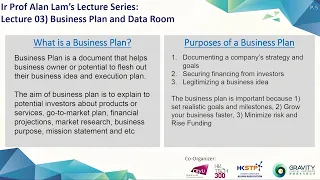Welcome to Alan’s Lecture on Business Plan Intro and Reference! In this enlightening session, Alan shares his expertise on crafting an impactful business plan that effectively communicates your vision, goals, and strategies to potential investors and stakeholders. By the end of this lecture, you’ll have the knowledge and tools to create a compelling business plan introduction and incorporate credible references that enhance its value. So, let’s embark on this journey of business planning together!
The Significance of a Well-Crafted Business Plan
Alan emphasizes the significance of a well-crafted business plan as a roadmap for your entrepreneurial journey. He highlights the importance of clearly articulating your business idea, market analysis, competitive advantage, financial projections, and growth strategies. A well-structured and comprehensive business plan not only helps you clarify your vision but also serves as a powerful tool to attract investors, secure funding, and guide your business’s growth.
Crafting an Engaging Business Plan Introduction
The business plan introduction sets the stage for your entire document. Alan shares valuable insights on crafting an engaging introduction that captures investors’ attention and entices them to explore further. He guides you on how to create a compelling opening statement that highlights the uniqueness of your business, showcases the problem it solves, and conveys the market opportunity. An effective introduction creates a strong first impression and compels readers to delve deeper into your business plan.
Understanding the Key Components of a Business Plan Introduction
Alan walks you through the key components that make up a powerful business plan introduction. He emphasizes the importance of including an executive summary, a brief overview of your business, a clear mission statement, and a summary of your market analysis and competitive landscape. Each component plays a crucial role in providing a snapshot of your business and setting the tone for the rest of the document.
Incorporating Credible References in Your Business Plan
Credible references add authenticity and credibility to your business plan. Alan shares strategies for incorporating references such as industry reports, market research, customer testimonials, case studies, and expert opinions. These references provide evidence of market demand, validate your business concept, and demonstrate that your strategies are grounded in real-world data and expertise. Including reputable references enhances the trustworthiness of your business plan and increases its persuasive power.
Conducting Thorough Market Research
Market research is a vital component of any successful business plan. Alan explains the importance of conducting thorough market research to understand your target audience, industry trends, and competition. He guides you on gathering relevant data, analyzing market dynamics, and identifying potential opportunities and challenges. Solid market research not only strengthens your business plan but also helps you make informed decisions and adapt to market demands.
Defining a Clear Business Mission and Vision
A clear and compelling business mission and vision are essential for guiding your business’s direction and inspiring others to join your journey. Alan provides insights on how to define a mission statement that encapsulates your business’s purpose and values. He also highlights the importance of a vision statement that outlines your long-term aspirations and the impact you aim to make. A well-defined mission and vision instill confidence and attract like-minded individuals to your cause.
Outlining Your Business Strategies and Objectives
Strategies and objectives form the core of your business plan. Alan delves into the process of outlining effective strategies that align with your mission and vision. He emphasizes the importance of setting clear objectives that are specific, measurable, achievable, relevant, and time-bound (SMART). Well-defined strategies and objectives demonstrate your business’s focus, direction, and growth potential to potential investors and stakeholders.
Developing Realistic Financial Projections
Financial projections are a critical aspect of any business plan. Alan provides guidance on developing realistic financial projections, including revenue forecasts, expense budgets, cash flow statements, and profitability analysis. He emphasizes the importance of using realistic assumptions, conducting sensitivity analysis, and demonstrating a clear path to profitability. Realistic financial projections instill confidence in investors and demonstrate your ability to manage finances effectively.
Finalizing and Reviewing Your Business Plan
Alan underscores the importance of finalizing and reviewing your business plan before presenting it to potential investors or stakeholders. He shares valuable tips on proofreading for grammar and spelling errors, ensuring consistency in formatting, and seeking feedback from trusted advisors or mentors. A well-polished and reviewed business plan reflects professionalism and attention to detail, enhancing its credibility and persuasiveness.
– THE END –
About Gravity Academy
Gravity Academy was born from a simple yet profound realization: the future of business hinges not only on financial success but also on social and environmental responsibility. In the increasingly interconnected and fast-paced global economy, entrepreneurs and corporate leaders face the challenge of building sustainable business models that contribute to the greater good while achieving their growth objectives.
From this realization, Gravity Capital Partners Company Limited, with its rich history of impactful investments, founded Gravity Academy. Our aim is to share the knowledge, experience, and skills that have driven our success with a new generation of business leaders — shaping not only their companies’ futures but the future of our planet.
